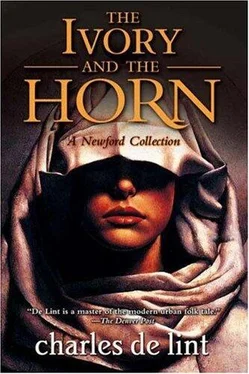2
One of the things I keep coming back to when I think of Gina is walking down Yoors Street on a cold, snowy Christmas Eve during our last year of high school. We were out Christmas shopping. I'd been finished and had my presents all wrapped during the first week of December, but Gina had waited for the last minute, as usual, which was why we were out braving the storm that afternoon.
I was wrapped in as many layers of clothing as I could fit under my overcoat and looked about twice my size, but Gina was just scuffling along beside me in her usual cowboy boots and jeans, a floppy felt hat pressing down her dark curls and her hands thrust deep into the pockets of her pea jacket. She simply didn't pay any attention to the cold. Gina was good at that: ignoring inconveniences, or things she wasn't particularly interested in dealing with, much the way— I was eventually forced to admit— that I'd taught myself to ignore the dark current that was always present, running just under the surface of her exuberantly good moods.
"You know what I like best about the city?" she asked as we waited for the light to change where Yoors crosses Bunnett.
I shook my head.
"Looking up. There's a whole other world living up there."
I followed her gaze and at first I didn't know what she was on about. I looked through breaks in the gusts of snow that billowed around us, but couldn't detect anything out of the ordinary. I saw only rooftops and chimneys, multicolored Christmas decorations and the black strands of cable that ran in sagging geometric lines from the power poles to the buildings.
"What're you talking about?" I asked.
"The 'goyles," Gina said.
I gave her a blank look, no closer to understanding what she was talking about than I'd been before.
"The gargoyles, Sue," she repeated patiently. "Almost every building in this part of the city has got them, perched up there by the rooflines, looking down on us."
Once she'd pointed them out to me, I found it hard to believe that I'd never noticed them before. On that corner alone there were at least a half-dozen grotesque examples. I saw one in the archway keystone of the Annaheim Building directly across the street— a leering monstrous face, part lion, part bat, part man. Higher up, and all around, other nightmare faces peered down at us, from the corners of buildings, hidden in the frieze and cornice designs, cunningly nestled in corner brackets and the stone roof cresting. Every building had them. Every building.
Their presence shocked me. It's not that I was unaware of their existence— after all, I was planning on architecture as a major in college; it's just that if someone had mentioned gargoyles to me before that day, I would have automatically thought of the cathedrals and castles of Europe— not ordinary office buildings in Newford.
"I can t believe I never noticed them before," I told her.
"There are people who live their whole lives here and never see them," Gina said.
"How's that possible?"
Gina smiled. "It's because of where they are— looking down at us from just above our normal sightline. People in the city hardly ever lookup."
"But still..."
"I know. It's something, isn't it? It really is a whole different world. Imagine being able to live your entire life in the middle of the city and never be noticed by anybody."
"Like a baglady," I said.
Gina nodded, "Sort of. Except people wouldn't ignore you because you're some pathetic street person that they want to avoid. They'd ignore you because they simply couldn't see you."
That thought gave me a creepy feeling, and I couldn't suppress a shiver, but I could tell that Gina was intrigued with the idea. She was staring at that one gargoyle, above the entrance to the Annaheim Building.
"You really like those things, don't you?" I said.
Gina turned to look at me, an expression I couldn't read sitting at the back of her eyes.
"I wish I lived in their world," she told me.
She held my gaze with that strange look in her eyes for a long heartbeat. Then the light changed and she laughed, breaking the mood. Slipping her arm in mine, she started us off across the street to finish her Christmas shopping.
When we stood on the pavement in front of the Annaheim Building, she stopped and looked up at the gargoyle. I craned my neck and tried to give it a good look myself, but it was hard to see because of all the blowing snow.
Gina laughed suddenly. "It knows we were talking about it."
"What do you mean?"
"It just winked at us."
I hadn't seen anything, but then I always seemed to be looking exactly the wrong way, or perhaps in the wrong way, whenever Gina tried to point out some magical thing to me. She was so serious about it.
"Did you see?" Gina asked.
"I'm not sure," I told her. "I think I saw something..."
Falling snow. The side of a building. And stone statuary that was pretty amazing in and of itself without the need to be animated as well. I looked up at the gargoyle again, trying to see what Gina had seen.
I wish I lived in their world.
It wasn't until years later that I finally understood what she'd meant by that.
3
Christmas wasn't the same for me as for most people— not even when I was a kid: My dad was born on Christmas day; Granny Ashworth, his mother, died on Christmas day when I was nine; and my own birthday was December 27. It made for a strange brew come the holiday season, part celebration, part mourning, liberally mixed with all the paraphernalia that means Christmas: eggnog and glittering lights, caroling, ornaments and, of course, presents.
Christmas wasn't centered around presents for me. Easy to say, I suppose, seeing how I grew up in the Beaches, wanting for nothing, but it's true. What enamored me the most about the season, once I got beyond the confusion of birthdays and mourning, was the idea of what it was supposed to be: peace and goodwill to all. The traditions. The idea of the miracle birth the way it was told in the Bible and more secular legends like the one telling how, for one hour after midnight on Christmas Eve, animals were given human voices so that they could praise the baby Jesus.
I remember staying up late the year I turned eleven, sitting in bed with my cat on my lap and watching the clock, determined to hear Chelsea speak, except I fell asleep sometime after eleven and never did find out if she could or not. By the time Christmas came around the next year I was too old to believe in that sort of thing anymore.
Gina never got too old. I remember years later when she got her dog Fritzie, she told me, "You know what I like the best about him? The stories he tells me."
"Your dog tells you stories," I said slowly.
"Everything's got a voice," Gina told me. "You just have to learn how to hear it."
4
The best present I ever got was the Christmas that Gina decided to be my friend. I'd been going to a private school and hated it. Everything about it was so stiff and proper. Even though we were only children, it was still all about money and social standing and it drove me mad. I'd see the public school kids, and they seemed so free compared to all the boundaries I perceived to be compartmentalizing my own life.
I pestered my mother for the entire summer I was nine until she finally relented and let me take the public transport into Ferryside where I attended Cairnmount Public School. By noon of my first day, I realized that I hated public school even more.
There's nothing worse than being the new kid— especially when you were busing in from the Beaches. Nobody wanted anything to do with the slumming rich kid and her airs. I didn't have airs; I was just too scared. But first impressions are everything, and I ended up feeling more left out and alone than I'd ever been at my old school. I couldn't even talk about it at home— my pride wouldn't let me. After the way I'd carried on about it all summer, I couldn't find the courage to admit that I'd been wrong.
Читать дальше












